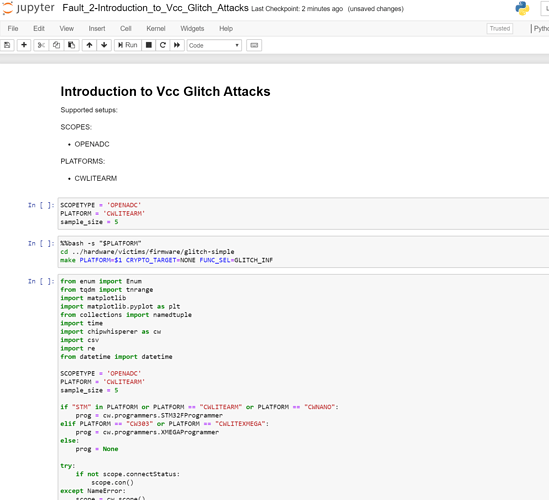@aross I am baffled. Error again 
USBError Traceback (most recent call last)
~/chipwhisperer/software/chipwhisperer/capture/scopes/openadc_interface/naeusbchip.py in con(self, sn)
86 #sn = None
—> 87 found_id = self.dev.con(idProduct=nae_products, serial_number=sn)
88 except (IOError, ValueError):
~/chipwhisperer/software/chipwhisperer/capture/scopes/cwhardware/ChipWhispererLite.py in con(self, *args, **kwargs)
49 def con(self, *args, **kwargs):
—> 50 return self._cwusb.con(*args, **kwargs)
51
~/chipwhisperer/software/chipwhisperer/hardware/naeusb/naeusb.py in con(self, idProduct, connect_to_first, serial_number)
584
–> 585 self.usbseralizer.open(dev[‘sn’])
586 foundId = dev[‘pid’]
~/chipwhisperer/software/chipwhisperer/hardware/naeusb/naeusb.py in open(self, serial_number)
157 cmdpacket = self.make_cmd(self.OPEN, serial_number)
–> 158 return self.process_rx(self.txrx(tx=cmdpacket))
159
~/chipwhisperer/software/chipwhisperer/hardware/naeusb/naeusb.py in process_rx(self, inp)
150 if resp == self.ERROR:
–> 151 raise payload
152
USBError: [Errno None] None
During handling of the above exception, another exception occurred:
Warning Traceback (most recent call last)
in
** 214 target = cw.target(scope)**
** 215 **
–> 216 setup()
** 217 rejection_builder()**
in setup()
** 49 **
** 50 prog = cw.programmers.STM32FProgrammer**
—> 51 scope = cw.scope()
** 52 **
** 53 time.sleep(0.05)**
~/chipwhisperer/software/chipwhisperer/init.py in scope(scope_type, sn)
209 scope_type = get_cw_type(sn)
210 scope = scope_type()
–> 211 scope.con(sn)
212 return scope
213
~/chipwhisperer/software/chipwhisperer/capture/scopes/base.py in con(self, sn)
56
57 def con(self, sn=None):
—> 58 if self._con(sn):
59 self.connectStatus = True
60
~/chipwhisperer/software/chipwhisperer/capture/scopes/OpenADC.py in _con(self, sn)
201 def _con(self, sn=None):
202 if self.scopetype is not None:
–> 203 self.scopetype.con(sn)
204
205 self.qtadc.sc.usbcon = self.scopetype.ser._usbdev
~/chipwhisperer/software/chipwhisperer/capture/scopes/openadc_interface/naeusbchip.py in con(self, sn)
87 found_id = self.dev.con(idProduct=nae_products, serial_number=sn)
88 except (IOError, ValueError):
—> 89 raise Warning(‘Could not connect to “%s”. It may have been disconnected, is in an error state, or is being used by another tool.’ % self.getName())
90
91 if found_id != self.last_id:
Warning: Could not connect to “NewAE USB (CWLite/CW1200)”. It may have been disconnected, is in an error state, or is being used by another tool.


